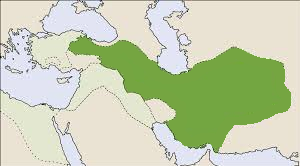Immortal Meals #23: Family Meals, Medan Style June 10, 2015
Author: Beach Combing | in : Ancient , trackbackThis is a first in the immortal meal series, a repast that is probably, we must hope, mythical, but one that launches a genre that we are still trying to forget two and a half millennia later.
First some background. Herodotus, the father of history, gives us only one account of the birth and childhood of Cyrus the Great, the first Persian Emperor and the destroyer of Medes. The tale is a panoply of myths and folklore, but interestingly Herodotus says that it was the most believable of three stories he was told! (He didn’t trouble readers with the other two).
Cyrus is born into the royal family of Mede of a Medan woman and a Persian father but after a worrying dream involving a urinating daughter his grandfather, the Median king Astyages tells a loyal servant Harpagus to dispose of the baby Cyrus. Harpagus instructs a shepherd to do just this, but the shepherd swaps a stillborn babe for baby Cyrus and the future Emperor grows up in a shepherd’s hut: a last distant echo of proletarian origins? Many years later the truth comes out and Astyages confesses himself pleased. His grandson has survived the murder his grandfather had planned for him and for some reason Astyages has forgotten the threatening omens. He cannot though forgive Harpagus for not carrying out his orders properly and so plans a ghastly return. Harpagus is invited to a feast and on the day in question his thirteen-year-old son goes on ahead.
At the hour of the supper, among other guests, Harpagus also attended. Before the rest, as well as before Astyages himself dishes of mutton were placed, but to Harpagus all the body of his son was served, except the head and the extremities, which were kept apart in a covered basked. After Harpagus seemed well satisfied with what he had eaten, Astyages asked him how he liked his fare: Harpagus expressed himself greatly delighted, the attendants brought him the basket which contained the head and extremities of his child, and desired him to help himself to what he thought proper. Harpagus complied, uncovered the vessel, and beheld the remains of his son.
Herodotus claims that Harpagus remained ‘master of himself and discovered no emotions’, he said that the ‘king’s will was always pleasing to him’ and left to bury what was left of his son. Harpagus and Cyrus would later destroy Astyages though, a lesson for all tyrants: don’t make your henchmen eat their children… This motif of being tricked into eating a family member is common in tale, though hopefully rare in life. A recent example was the poorly-attested fabula that ISIS troops had made a mother eat her son. Is Herodotus’s story the oldest instance? drbeachcombing AT yahoo DOT com Note that though the meal is, as noted above, presumably myth, Harpagus is elsewhere attested. The man himself was lived, breathed, and, of course, ate.



